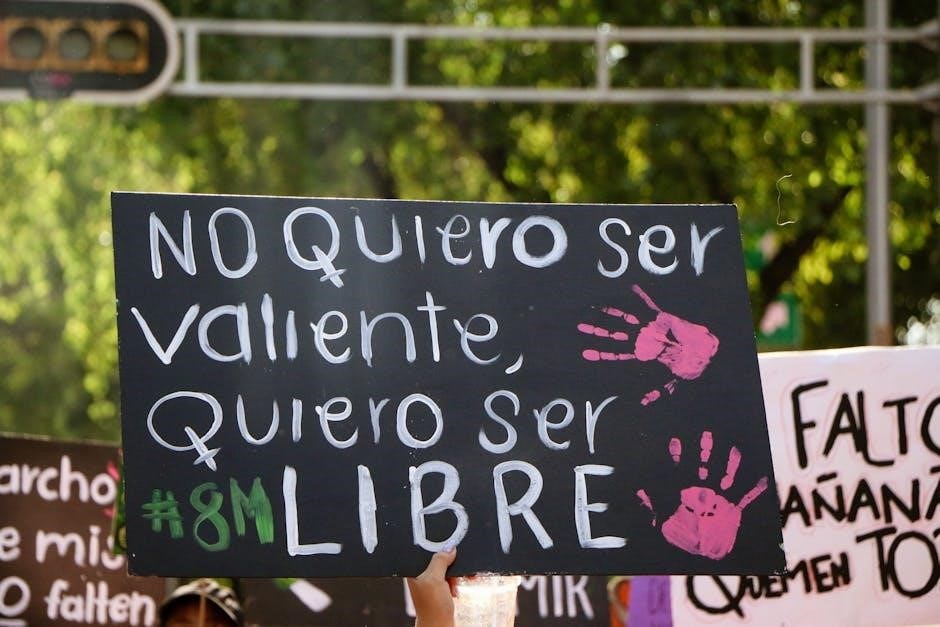Miranda Rights in Spanish ensure Spanish-speaking individuals understand their constitutional rights during detention․ The rights include remaining silent and consulting an attorney‚ crucial for legal protection and fairness․
1․1․ Overview of Miranda Rights
Miranda Rights are constitutional protections ensuring individuals under custody understand their rights․ They include the right to remain silent‚ the right to an attorney‚ and the warning that statements can be used in court․ These rights‚ established by the 1966 Miranda v․ Arizona case‚ are crucial for preventing self-incrimination and ensuring fair legal proceedings․ Spanish translations of Miranda Rights are essential for non-English speakers‚ though variations exist across jurisdictions‚ highlighting the need for accurate and uniform interpretations to uphold legal fairness and clarity․
1․2․ Importance of Spanish Translation
The accurate translation of Miranda Rights into Spanish is vital for ensuring non-English speakers understand their constitutional protections․ Over 870‚000 Spanish-speaking individuals are detained annually in the U․S․‚ making clear and precise translations essential to prevent misunderstandings and legal disputes․ The Spanish translation must reflect the exact legal meaning of the rights‚ including the right to remain silent and the right to an attorney․ Accurate translations ensure fairness and uphold the constitutional guarantees for all individuals‚ regardless of language barriers․

Historical Background of Miranda Rights
Miranda Rights originated from the 1966 Supreme Court case Miranda v․ Arizona‚ ensuring individuals are informed of their right to silence and legal counsel during custodial interrogations․
2․1․ The Landmark Case: Miranda v․ Arizona (1966)
The landmark case of Miranda v․ Arizona (1966) established that individuals in custody must be informed of their right to remain silent and consult an attorney․ The Supreme Court ruled that statements made without these warnings are inadmissible in court‚ safeguarding the Fifth Amendment right against self-incrimination․ This decision fundamentally changed police procedures and ensured constitutional protections for all detainees‚ including Spanish-speaking individuals‚ necessitating accurate translations of Miranda warnings to maintain fairness and legality in legal proceedings․
2․2․ Evolution of Miranda Rights Over Time
Since the landmark Miranda v․ Arizona case in 1966‚ Miranda rights have evolved to ensure constitutional protections for all individuals‚ including Spanish-speaking detainees․ The Supreme Court’s decision emphasized the necessity of clear warnings in a language defendants understand․ Over time‚ challenges arose regarding accurate Spanish translations‚ leading to variations across jurisdictions․ Efforts to standardize Miranda warnings in Spanish have grown‚ recognizing the importance of uniformity to prevent misunderstandings and ensure legal protections․ This evolution underscores the ongoing commitment to fairness and accessibility in the justice system for non-English speakers․

Key Components of Miranda Rights in Spanish
Miranda Rights in Spanish include the right to remain silent‚ the right to an attorney‚ and the warning that statements may be used against them․
3․1․ The Right to Remain Silent
The right to remain silent‚ as outlined in Miranda Rights‚ protects individuals from self-incrimination․ Spanish-speaking individuals must be informed they can stay quiet and refuse to answer questions․ This safeguard ensures that statements made under duress or without understanding are not used in court․ It is a fundamental principle of due process‚ guaranteeing that suspects are aware of their legal protections from the moment of detention or interrogation․ Proper translation of this right is essential for fairness in legal proceedings․
3․2․ The Right to an Attorney
The right to an attorney‚ as detailed in Miranda Rights‚ ensures individuals can consult legal counsel during questioning․ Spanish-speaking detainees must be informed of this right in their language to ensure comprehension․ This protection‚ rooted in the Fifth and Sixth Amendments‚ safeguards against coercion and ensures fair representation․ Accurate translation of this right in Spanish Miranda Rights documents is vital to prevent legal disparities and guarantee equal access to justice for non-English speakers․ Proper communication of this right is essential for upholding constitutional protections․
3․3․ Consequences of Waiving Miranda Rights
Waiving Miranda Rights means individuals relinquish their right to remain silent and consult an attorney․ Statements made thereafter can be used as evidence in court․ This decision must be voluntary and informed‚ with clear understanding of the rights being surrendered․ For Spanish-speaking individuals‚ accurate translation of waiver documents is critical to ensure comprehension․ Failure to provide proper translation can lead to legal challenges․ Law enforcement must ensure the waiver is knowingly and willingly made‚ avoiding any coercion or misunderstanding․

Challenges in Translating Miranda Rights into Spanish
Translating Miranda Rights into Spanish faces challenges like variations in translations‚ lack of uniformity‚ and ensuring legal accuracy․ This can lead to misunderstandings and legal complications if not done correctly․
4․1․ Variations in Spanish Translations Across Jurisdictions
Different jurisdictions often use varying Spanish translations of Miranda Rights‚ leading to inconsistencies․ Some versions may omit or misphrase key legal concepts‚ potentially causing confusion for Spanish-speaking individuals․ Law enforcement agencies across the U․S․ and its territories may adopt their own translations‚ resulting in a lack of uniformity․ This variability can undermine the clarity and effectiveness of the rights‚ particularly for non-English speakers relying on accurate information to understand their legal protections․ Such discrepancies highlight the need for standardized translations to ensure fairness and legal precision․
4․2․ Ensuring Accuracy and Uniformity
Ensuring the accuracy and uniformity of Miranda Rights in Spanish is crucial for legal fairness․ Collaboration between legal experts and linguists can help standardize translations‚ avoiding regional discrepancies․ A consistent script across jurisdictions prevents misunderstandings and ensures clarity․ Regular audits and updates to legal standards further enhance reliability․ By maintaining precise and uniform translations‚ the rights of Spanish-speaking individuals are protected‚ minimizing legal challenges and ensuring equitable treatment under the law․

The Importance of Miranda Rights in Spanish PDF Format
Miranda Rights in Spanish PDF ensures accessibility for non-English speakers‚ providing clear legal protections and compliance with constitutional requirements‚ essential for fairness and understanding in legal proceedings․
5․1․ Accessibility for Non-English Speakers
Miranda Rights in Spanish PDF format are crucial for ensuring non-English speakers understand their legal protections․ Over 870‚000 Latinos annually face detention without fluent English‚ making accurate Spanish translations vital․ These documents provide clear‚ standardized information about the right to remain silent and consult an attorney․ Uniformity in translations ensures fairness and prevents misunderstandings․ Accessibility in Spanish upholds constitutional rights and fosters trust in the legal system‚ emphasizing equality for all individuals‚ regardless of language proficiency․
5․2․ Legal Requirements for Spanish-Language Materials
The legal system mandates that Spanish-language Miranda Rights materials must be accurate and uniform to ensure compliance with constitutional rights․ The Supreme Court’s Miranda v․ Arizona ruling requires clear communication of rights‚ including the Fifth Amendment protection against self-incrimination․ Providing precise Spanish translations is essential to avoid legal challenges and potential case dismissals․ Law enforcement agencies must ensure these materials are accessible and understood‚ upholding due process and equal protection under the law for all individuals‚ regardless of language barriers․

How to Obtain a Miranda Rights Spanish PDF
Download the Miranda Rights in Spanish PDF from official law enforcement or legal websites․ Verify the document’s accuracy to ensure compliance with legal standards and proper translation․
6․1․ Downloading from Official Sources
Miranda Rights in Spanish PDFs can be downloaded from official law enforcement or legal websites․ Ensure the source is reliable‚ such as government or court-affiliated platforms․ These documents are often provided to guarantee accuracy and compliance with legal standards․ Users can search for “Miranda Rights Spanish PDF” on official portals or legal databases․ Always verify the source to avoid incorrect or incomplete versions‚ ensuring the document meets legal requirements and is properly translated for clarity and understanding․
6․2․ Verifying the Accuracy of the Document
Verifying the accuracy of a Miranda Rights Spanish PDF is crucial to ensure legal validity․ Compare the document with official versions from trusted sources‚ such as court websites or legal databases․ Check for proper translation of legal terms and consistency with the English version․ Ensure all rights‚ including the right to remain silent and consult an attorney‚ are clearly stated․ Consult legal experts or use official templates to confirm the document’s authenticity and compliance with legal standards․ Accuracy prevents potential legal challenges and ensures proper understanding of rights․

Consequences of Not Providing Miranda Rights in Spanish
Failure to provide Miranda Rights in Spanish can lead to legal challenges‚ case dismissals‚ and violations of constitutional rights‚ undermining the fairness of legal proceedings․

7․1․ Potential for Misunderstandings
When Miranda Rights are not accurately provided in Spanish‚ detainees may misunderstand their rights‚ leading to confusion about silence and attorney privileges․ Inaccurate translations or incomplete information can result in detainees unintentionally waiving their rights․ This misunderstanding can compromise the legality of statements obtained during interrogation․ Ensuring precise and uniform translations is critical to avoid such issues‚ as non-English speakers must fully comprehend their constitutional protections․ Miscommunication can undermine the fairness of legal proceedings and jeopardize the validity of confessions․ Standardized Spanish versions are essential to prevent these errors․

7․2․ Legal Implications and Case Dismissals
Failing to provide accurate Miranda Rights in Spanish can lead to legal consequences‚ including case dismissals․ Inaccurate translations may render confessions inadmissible‚ undermining prosecution evidence․ Courts often dismiss cases where rights were not properly conveyed‚ as this violates due process․ Additionally‚ violations can result in appeals and overturning of convictions‚ highlighting the importance of precise translations․ Without proper documentation‚ such as a Miranda Rights Spanish PDF‚ legal challenges are more likely‚ emphasizing the need for standardized materials to prevent judicial setbacks and ensure fair proceedings for Spanish-speaking defendants․

Case Studies and Examples
Historical cases like Miranda v․ Arizona (1966) established the foundation for Miranda Rights․ Modern examples highlight challenges in Spanish translations‚ impacting case outcomes and defendant protections significantly․
8․1․ Historical Cases Involving Spanish-Speaking Defendants
The landmark case of Miranda v․ Arizona (1966) set the precedent for Miranda Rights‚ emphasizing the necessity of informing detainees of their rights․ Spanish-speaking defendants have historically faced challenges due to inadequate translations of these rights‚ leading to legal disputes and misunderstandings․ Cases have highlighted the importance of accurate Spanish translations to ensure fairness and constitutional protections․ Over time‚ courts have increasingly recognized the need for precise Miranda warnings in Spanish‚ addressing the unique needs of non-English speakers in the justice system․
8․2․ Modern Applications and Challenges
Today‚ Miranda Rights in Spanish remain critical for ensuring justice for non-English speakers․ Modern challenges include non-uniform translations across jurisdictions‚ leading to legal disputes․ Over 870‚000 Latinos annually face detention without precise Miranda warnings‚ risking constitutional violations․ Courts now emphasize accurate translations to prevent misunderstandings․ Despite progress‚ inconsistencies persist‚ highlighting the need for standardized Spanish Miranda Rights to guarantee fair treatment for all detainees‚ particularly vulnerable populations like immigrants․
Miranda Rights in Spanish are vital for ensuring justice and constitutional protections․ Accurate translations and accessibility remain crucial to uphold rights for Spanish-speaking individuals effectively․
9․1․ Summary of Key Points
Miranda Rights are fundamental to ensuring justice and protecting individuals’ constitutional rights․ Providing these rights in Spanish is essential for non-English speakers to understand their legal protections․ Accurate translations are crucial to avoid misunderstandings and ensure fairness in legal proceedings․ Variations in translations across jurisdictions highlight the need for uniformity․ Access to Miranda Rights in Spanish PDF formats promotes accessibility and compliance with legal requirements․ Ensuring these rights are clearly communicated is vital for upholding justice and safeguarding the rights of Spanish-speaking individuals in the United States․
9․2․ Future Directions for Miranda Rights in Spanish
Future efforts should focus on standardizing Miranda Rights translations to ensure clarity and consistency nationwide․ Technological advancements‚ such as digital tools and AI‚ can aid in creating accurate and accessible versions; Collaboration between legal experts and language professionals is essential to refine translations․ Additionally‚ expanding outreach and education about these rights can empower Spanish-speaking communities․ Ensuring uniformity and updating materials regularly will help address evolving legal and linguistic needs‚ promoting fairness and justice for all individuals․

Leave a Reply
You must be logged in to post a comment.